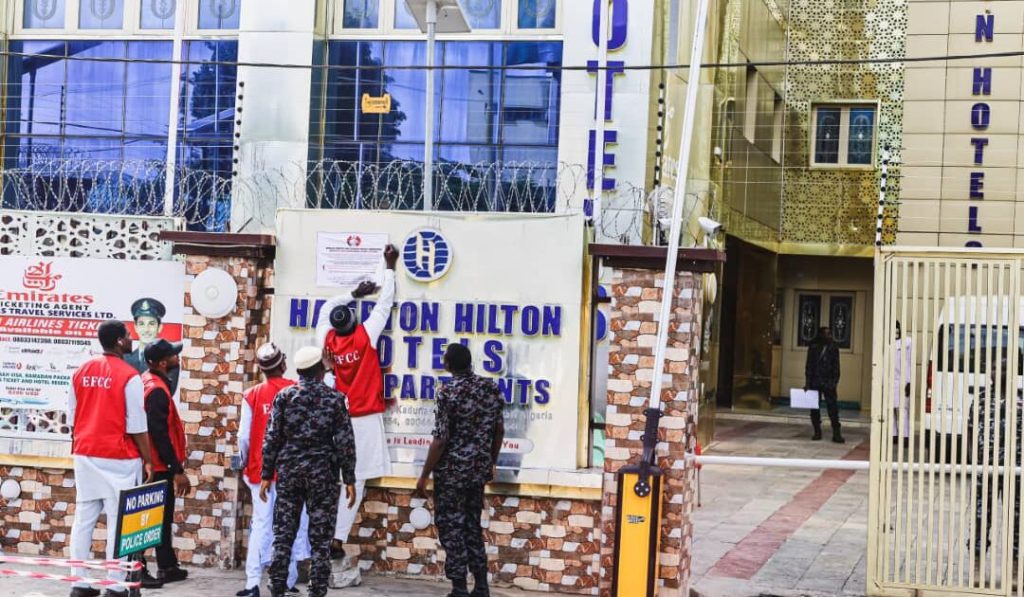The Economic and Financial Crimes Commission (EFCC), through its Special Control Unit against Money Laundering (SCUML), took decisive action against Hampton Hilton Hotel and Apartments in Kaduna, Nigeria, for repeated violations of anti-money laundering regulations. The hotel’s failure to comply with the Money Laundering (Prevention and Prohibition) Act, 2022, and the Anti-Money Laundering/Combating the Financing of Terrorism (AML/CFT) regulations of the Financial Action Task Force (FATF) led to its ultimate closure. This case highlights the EFCC’s commitment to enforcing these crucial regulations and deterring financial crimes within designated non-financial businesses and professions (DNFBPs).
The initial compliance evaluation conducted by SCUML on June 4, 2024, uncovered several breaches of the stipulated regulations. As a consequence, administrative sanctions were imposed on Hampton Hilton Hotel and Apartments. The specifics of these initial infractions were not detailed in the EFCC statement, but their severity warranted immediate action. The hotel was subsequently given a window of opportunity to rectify the identified shortcomings. Despite the initial warning, a follow-up compliance assessment on June 13, 2025, revealed further violations. This demonstrated a disregard for the regulatory framework and a failure to take the necessary corrective measures.
The repeated nature of the violations prompted SCUML to impose a fine of N2.3 million on the establishment, along with a seven-day ultimatum for payment and full compliance with the relevant regulations. This penalty underscored the seriousness of the infractions and the need for prompt rectification. However, Hampton Hilton Hotel and Apartments failed to meet the imposed deadline for payment and also disregarded SCUML’s invitation to participate in a compliance evaluation. This blatant disregard for the regulatory process ultimately led to the sealing of the hotel premises.
The sealing of Hampton Hilton Hotel and Apartments serves as a potent reminder of the consequences of non-compliance with anti-money laundering regulations. The EFCC emphasized its unwavering dedication to enforcing these regulations and holding businesses accountable for any transgressions. This action sends a clear message to other DNFBPs that failure to adhere to AML/CFT regulations will not be tolerated. The EFCC’s actions underscore the importance of compliance and the potential repercussions faced by businesses that disregard their regulatory obligations.
The Money Laundering (Prevention and Prohibition) Act, 2022, and the AML/CFT regulations are crucial instruments in combating financial crimes. They provide a framework for identifying and preventing money laundering and the financing of terrorism, safeguarding the financial system from illicit activities. DNFBPs, such as hotels, casinos, and real estate agencies, are particularly vulnerable to exploitation by criminals seeking to launder money. Therefore, stringent compliance with these regulations is paramount in mitigating such risks and maintaining the integrity of the financial system.
The EFCC’s actions against Hampton Hilton Hotel and Apartments exemplify the organization’s commitment to combating financial crimes and upholding the rule of law. By taking decisive action against non-compliant entities, the EFCC reinforces the importance of adherence to AML/CFT regulations. This case serves as a deterrent to other businesses and professions, encouraging them to prioritize compliance and contribute to a more robust and transparent financial system. The EFCC’s proactive approach aims to safeguard the Nigerian economy and uphold its international obligations in the fight against financial crimes. This demonstration of resolve contributes significantly to strengthening the integrity of the financial landscape and fostering a culture of compliance within the business community.


